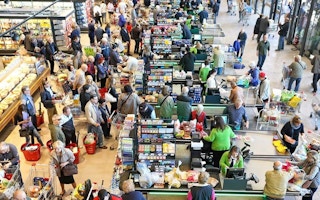Mobile phone apps that point shoppers to discounted groceries, codes on chicken and cheese that display their origin, and water dispensers and degradable packaging that slash plastic use.
These are just some of the steps European supermarkets are taking to attract customers increasingly concerned about the environmental cost of farming, food waste and everyday products.
“We are witnessing a bit of a seismic change in attitudes in consumers who are purchasing food,” said Julian Burnett, vice president for the distribution sector at IBM UK & Ireland.
“There’s more awareness than ever before about the provenance of food and sustainable practices,” he added.
Tech giant IBM recently conducted an online survey of 6,000 consumers in Britain, Spain and Italy, which showed a majority in the two southern European countries would be willing to pay more and shop at places that support a greener food system.
The exercise was prompted by the growing demand faced by IBM’s retail clients to produce food sustainably - concerns that are likely to increase in the future, said Burnett.
“We have the same feeling,” said Fausto Iori, CEO of NaturaSi, an Italian organic supermarket chain with about 500 stores countrywide, noting customers have responded positively to the company’s efforts to cut waste.
Three months ago, NaturaSi started putting products nearing their expiry date on Too Good To Go, an app available in 15 countries.
“We sold 10,000 boxes (equivalent to 10 tonnes) of food through the app,” he said.
NaturaSi was also the first Italian supermarket to install water dispensers - blue, vending machine-like boxes with a touch screen - to shift customers away from plastic bottles, he said.
Italians consume 206 litres of bottled water per year, the second highest in the world after Mexico, according to Italian environmental non-profit Legambiente.
But NaturaSi’s customers are keen to kick the habit, Iori told the Thomson Reuters Foundation.
French retailing giant Carrefour SA, meanwhile, is deploying blockchain technology to compile detailed information on 24 products, including chicken, cheese, milk and oranges, in five countries, said project manager Emmanuel Delerm.
Customers can scan a QR code on a packet of chicken with their phones and find out when the bird was born, who the farmer is, if it was raised using antibiotics, when it was slaughtered and processed, and when it arrived at the store, he said.
“In all the countries where we are operating, there is an interest in transparency and traceability - not only the provenance but the conditions in which the products have been produced and harvested,” Delerm explained.
The company, which worked on its blockchain platform with IBM, said sales of those products had increased.
In neighbouring Spain, popular supermarket chain Mercadona is teaming up with an incubator to find and fund start-ups to help it eliminate plastics, reduce waste and save energy.
Pre-paid farming?
Daniel Vennard, director of the London-based Better Buying Lab, which encourages more sustainable eating, said retailers were no longer competing only on price, quality and convenience.
“That’s still very important but now I think (they) are increasingly looking to differentiate their offer and almost think of themselves as lifestyle brands, embodying the values of the consumers they want to attract,” he said.
He pointed to a 2018 Christmas advert from British frozen-food chain Iceland about an orangutan whose habitat was destroyed by deforestation linked to palm oil production.
It triggered a public conversation about the issue, after it was banned by regulators, enabling the firm to reposition itself as more than a place for affordable food, Vennard said.
Better Buying Lab, set up by the World Resources Institute, works with Sainsbury’s, Britain’s second-biggest supermarket group, and French food services group Sodexo, among others.
Last month Sainsbury’s pledged to cut its greenhouse gas emissions to net zero by 2040, a decade ahead of the British government’s own target.
NaturaSi’s Iori, meanwhile, is mulling how to use blockchain for a new “pre-paid farming” model that would allow loyal customers to support farmers along the value chain by buying green products six months to a year before they receive them.
“This is the next step … under the sustainability revolution,” he said.
Climate vs. cost
Agriculture, forestry and other land uses together account for nearly a quarter of the greenhouse gas emissions heating up the planet, according to the UN climate science panel.
Throwing away food also releases climate-warming methane when left to rot in landfill.
Intensive farming, meanwhile, is a major cause of accelerating soil erosion, as it strips away the highly fertile top layer, which could threaten global food production, experts have warned.
IBM’s survey suggests consumers are concerned about issues like these - and many, particularly in Spain and Italy, plan to vote with their wallet, it revealed.
Three-quarters of respondents in those two countries said they were willing to pay extra for food grown using practices that do not degrade the soil.
More than half also said they would spend at least 5% more than average for groceries from a sustainable source and would shop at supermarkets that are working to cut food waste.
British consumers expressed similar sentiments but in fewer numbers, with just over half saying high prices stopped them eating more responsibly sourced food.
“The challenge in the UK is producing better products for near enough the same price,” said Andrew Opie, director of food and sustainability at the British Retail Consortium, whose members include all major supermarkets.
The top issue they have faced for the last 18 months has “undoubtedly” been plastics and packaging, with constant enquiries from consumers and green groups, he noted.
Now the body is starting to see a similar pattern with public concern over climate change.
“The protests here … have definitely put it much higher on the agenda for supermarkets,” Opie said.
This story was published with permission from Thomson Reuters Foundation, the charitable arm of Thomson Reuters, that covers humanitarian news, climate change, resilience, women’s rights, trafficking and property rights. Visit http://news.trust.org/climate.










